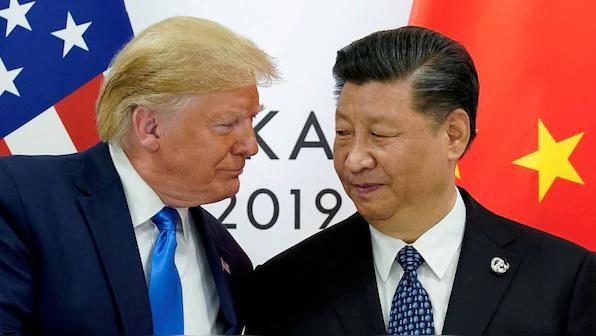
Title: China Refuses to Join Denuclearisation Talks with US & Russia
In a recent development, China has refused to join trilateral denuclearisation talks with the United States and Russia, rejecting President Donald Trump’s call to include Beijing in future negotiations. This decision has sparked concerns about the potential implications on global efforts to reduce nuclear threats.
According to a report by Moneycontrol, Chinese Foreign Ministry Spokesperson Guo Jiakun stated that the expectation was “neither reasonable nor realistic” as “China and US are not at the same level at all in terms of nuclear capabilities.” This statement comes as a response to President Trump’s attempt to involve China in the denuclearisation talks, which were initially planned as a bilateral discussion between the US and Russia.
The US-Russia talks were intended to focus on reducing the number of nuclear weapons held by both countries, with the aim of creating a more stable and secure global environment. However, China’s refusal to participate in the talks has raised questions about the effectiveness of the negotiations.
China’s reluctance to join the denuclearisation talks is not surprising, given its growing military capabilities and its increasing assertiveness in the international arena. As the world’s most populous country, China has been investing heavily in its military, including the development of nuclear weapons.
In recent years, China has been expanding its nuclear arsenal, with estimates suggesting that it has over 280 nuclear warheads. This growth in nuclear capabilities has led to concerns among neighboring countries and global powers about China’s intentions and its potential role in regional and global security dynamics.
The US, in particular, has been critical of China’s nuclear expansion, viewing it as a threat to regional stability and the global balance of power. The Trump administration has been pressing China to engage in denuclearisation talks, citing the need for a more comprehensive approach to nuclear disarmament.
However, China’s refusal to participate in the talks is unlikely to change its nuclear posture, at least in the short term. China has been clear about its desire to maintain its nuclear deterrent and to continue developing its military capabilities.
In a statement, Guo Jiakun emphasized that China’s nuclear capabilities were “not aimed at any country or region” and that Beijing was committed to maintaining a “no-first-use” policy. This policy, which was first introduced in the 1960s, outlines China’s commitment to refraining from using nuclear weapons first in the event of a conflict.
While China’s refusal to join the denuclearisation talks is unlikely to change its nuclear posture, it does raise questions about the effectiveness of global efforts to reduce nuclear threats. The US-Russia talks, which were initially planned as a major breakthrough in nuclear disarmament, are now likely to be overshadowed by China’s refusal to participate.
The implications of China’s decision are far-reaching, with potential consequences for regional and global security dynamics. The refusal to join the talks is likely to embolden China’s neighbors, who have been expressing concerns about Beijing’s growing military capabilities.
The decision is also likely to create tensions between the US and China, which have been locked in a trade war and are engaged in a series of diplomatic spats. The refusal to join the talks is seen as a major setback for the US, which had hoped to use the denuclearisation talks to engage China in a more constructive dialogue.
In conclusion, China’s refusal to join denuclearisation talks with the US and Russia is a significant development with far-reaching implications for global security dynamics. The decision is likely to create tensions between the US and China, while also raising questions about the effectiveness of global efforts to reduce nuclear threats.
As the world continues to grapple with the challenges posed by nuclear weapons, it is essential to engage in constructive dialogue and to work towards a more comprehensive approach to nuclear disarmament. The refusal of China to join the talks is a setback, but it also presents an opportunity for the international community to re-evaluate its approach to nuclear disarmament and to work towards a more sustainable and secure future.



